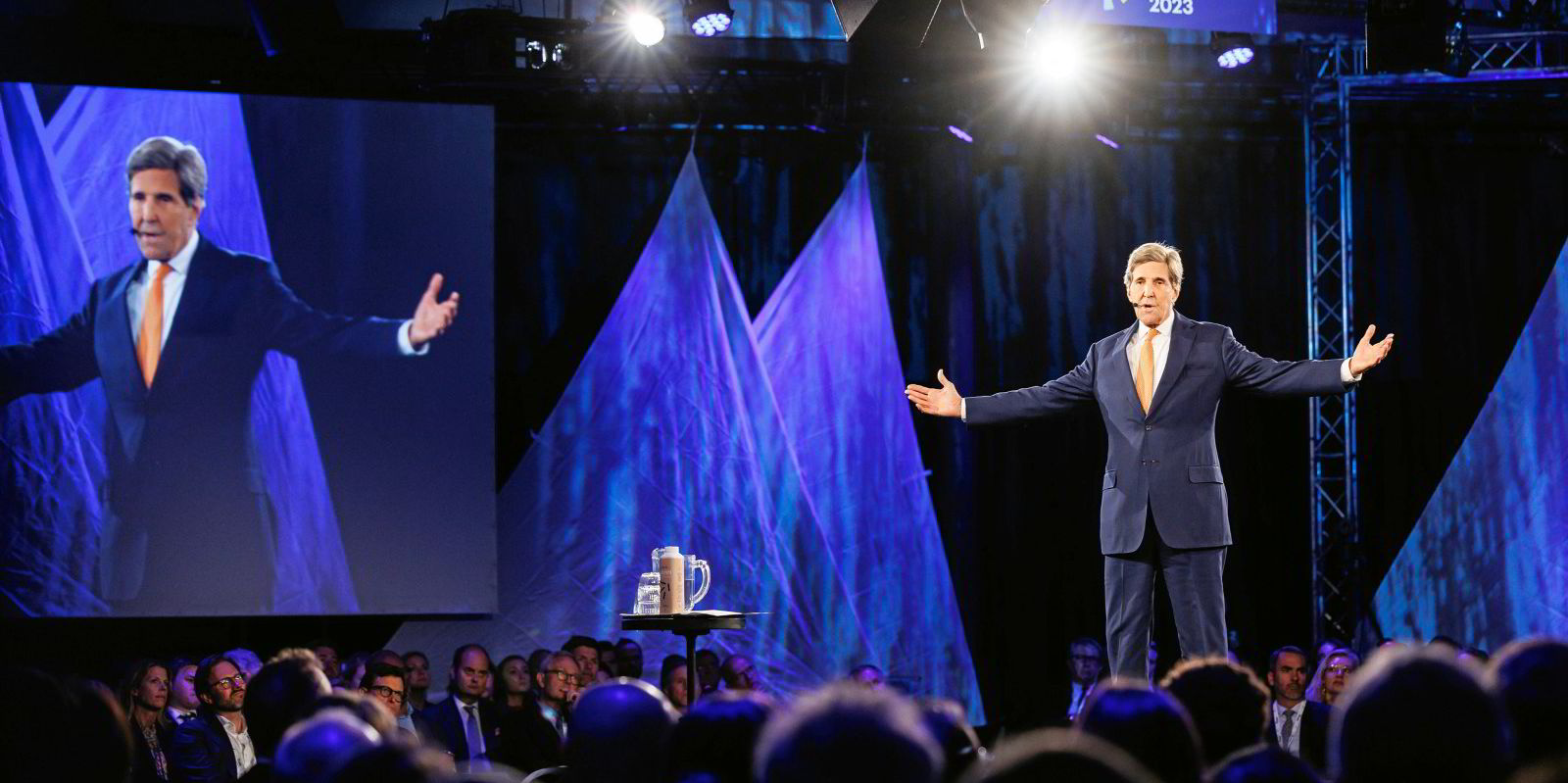The International Maritime Organization is gearing up for historic decisions next week that could see the UN shipping regulator adopt a zero-carbon or net zero emissions target.
But as consensus builds towards adopting a more ambitious strategy at the close of the Marine Environment Protection Committee (MEPC) meeting next week, IMO delegations remained divided on the timeline for adopting the so-called midterm policy measures that could include a carbon levy or similar mechanism to tax emissions.
Discussions over what to do next will be crucial as the US, European Union, UK and others urge the MEPC to adopt interim targets next week that aim to slash greenhouse gas emissions by 37% in 2030 and by 96% in 2040.

As a working group deliberates this week ahead of the key meeting, several nations’ delegations urged fellow member states to embark on an ambitious timeline for adopting midterm measures, which are also expected to include regulations that would limit the greenhouse gas footprint of fuels.
In the proposal demonstrating the most urgency, the Marshall Islands was joined by fellow Pacific archipelago nations Solomon Islands and Tuvalu to urge a carbon levy for shipping by 2025.
A representative for the Marshall Islands, whose name was not given, said on Tuesday that an impact study on midterm measures should start next week to be completed in time for the next MEPC meeting scheduled for April 2024.
Then at the meeting scheduled for autumn of next year, the IMO should adopt the chosen measures.
“The IMO is significantly behind where it should be in dealing with GHG emissions from ships,” she said, referring to greenhouse gas emissions. “All further delay can be measured in terms of escalating costs — escalating costs to the industry and to member states and to the most climate vulnerable and to future generations.
Adoption in 2025
Other countries are less ambitious. The US, UK, South Korea, Germany, Norway, the Netherlands and Sweden were among nations that voiced support on Tuesday for a timeline that would see midterm measures adopted in 2025, once an impact assessment is carried out, and for the new policies to enter into force in 2027.
While many IMO stakeholders have pointed to adopting a levy or another mechanism to put a price tag on carbon, the US has yet to get behind that measure, although several US officials have said that the administration of US President Joe Biden is open to discussion around a tax on greenhouse gas emissions. Instead, the US has voiced clear support for a fuel standard that would ratchet down emissions.

A timeline targeting 2027 is too ambitious for other nations.
A delegate for China said the country is concerned about the proposed timelines. The official, whose name was not given, said the schedule needs to allow time for a comprehensive assessment of the impact of the proposed measures.
‘Problematic’ rush
“Rushing into decisions will be problematic so we have to be realistic in setting the timeline for the adoption of the midterm measures,” the delegate said.
Argentina IMO representative Fernanda Millicay, who was among the most outspoken during Tuesday afternoon’s discussions, called for a “not detailed” approach to the timeline.
She described a process in which IMO delegations were hesitant to take proposed measures off the table until a group of countries got together and proposed a basket of measures without assessing the negative impacts on some countries, fuelling worries of an energy transition that could deliver a blow to developing economies.
That resulted in a “huge divide” that she said is still being felt today.
Building bridges
“Many of us are trying to build bridges to end it, so we should avoid that scenario,” she said. “We would add that it is not possible to commit to dates regarding the adoption of measures without having an indication of how long it would take to design them.”
The delegate for the Cook Islands, whose name was not available, pointed out that a review of the IMO’s first round of decarbonisation regulations, known as the Carbon Intensity Indicator and the Energy Efficiency Existing Ship Index, is not scheduled to be complete until January 2026.
“We are not in a position to adopt the midterm measures,” he said.

___________
‘It’s something we’ll look at’: US still on the fence on carbon levy for shipping
The US is among a chorus of nations calling for the International Maritime Organization to target a zero-carbon goal for 2050 and for interim targets leading up to that.
But the administration of US President Joe Biden is not throwing its support behind a tax on the industry’s greenhouse gas emissions, at least not yet, even as a growing number of nations have supported such a measure.
Ahead of two weeks of crucial meetings at the IMO, a senior administration official said the US is supporting interim targets in 2030 to cut shipping emissions by 37% and supports a global fuel standard that would ratchet down greenhouse gas content.
___________
Podcast: What the Eneti-Cadeler merger says about the hot WTIV market
When Cadeler listed its shares on the Oslo Stock Exchange in November 2020, it had a mission: to grow into the preferred contractor in the offshore wind turbine installation business.
And chief executive Mikkel Gleerup told a March conference call that the Denmark-based owner of wind turbine installation vessels (WTIVs) was looking at several strategic moves in a fast-growing market.
As TradeWinds has reported, Cadeler has picked one of those strategic moves: a merger with New York-listed rival Eneti that will create the world’s largest owner of WTIVs.
Offshore wind market experts told TradeWinds’ Green Seas podcast that the proposed merger is among recent transactions that highlight a tightening market for WTIVs, which presents a lucrative opportunity for their owners but has sparked efforts by wind project developers to lock in tonnage before a shortage of supply.
Click here to listen to the episode.
___________
After 14 years, global recycling rules enter into force as Liberia and Bangladesh sign up
Adam Corbett reports that the Hong Kong International Convention for the Safe and Environmentally Sound Recycling of Ships will enter into force in two years.
Liberia has followed Bangladesh and notified the International Maritime Organization it has ratified.
After international cooperation between governments, the Hong Kong Convention now meets its complicated conditions on balancing ratifying states’ tonnage and recycling countries’ capacity.
Read more
- Podcast: What the Eneti-Cadeler merger says about the hot WTIV market
- Viewpoint: The time is now for the IMO to address the climate crisis
- ‘It’s something we’ll look at’: US still on the fence on carbon levy for shipping
- Editor’s selection: Troim’s back, carbon gambit and shipbroker goes bust
- Green Seas: India gets impatient as ship recycling treaty ratification nears
- Navigator and Bumi forge preliminary deal to launch UK-focused CCS venture



